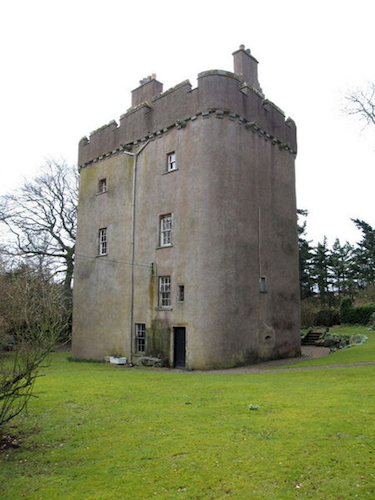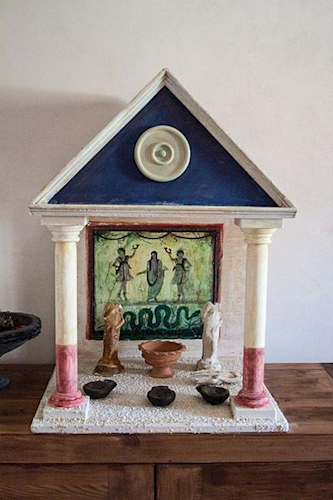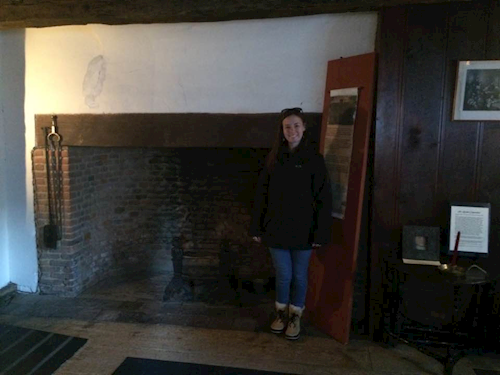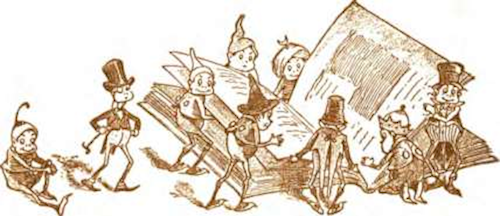
In this article, we will learn about household Gods and Spirits according to ancient tradition in Europe. We will also learn about ancestors in the household and household fairies. Join me on an adventure into the past, to a world where our venerable ancestors lived alongside spritely and vengeful household spirits.

Cranshaw Castle in Scotland is home to a household fairy called a brownie.
Times have changed since the times of our ancestors. Our ancestors’ routines and customs focused on appeasing the spirits in nature and spirits in their homes. The belief in spirits of trees, rivers, and even spirits in their homes was not just “silly superstition”…it was reality. From China to England and everywhere in between, our ancestors believed in these spirits and took precautions not to provoke them. Nowadays, the majority of people don’t believe in spirits in the way our ancestors did. Sure, we might believe in God or angels, but the belief in household spirits, revenants, and fairies has all but faded.
The ancient Romans honored household gods called Lares. Each household maintained an altar, similar to the re-created house altar shown above. In the richer homes, there was a painting or sculpture to represent the household gods and offerings left in front. The household gods’ images were placed at the dinner table to partake in a family meal. These Roman household gods were guardian spirits who protected the home and the family from illness and invasion. Lares weren’t only household gods in Roman times, they also guarded places in nature. This points to the fact that lares were originally nature spirits brought into the home and deified.

A recreation of a Roman lare house altar for household gods.
Our ancestors believed everything in nature had consciousness. When trees were cut down and other things from nature were used to build a home the fairies attached to these items were brought into the home. Others believed the fairies occupying the landscape where a home was built became domestic household spirits. This is why there were many superstitions as to where a home was built. For example, our Scandinavian ancestors stayed the night at the site of a new home to see if evil spirits manifested. If the person slept peacefully, the home was built there. There were different methods of testing a suitable site, including checking the ground or nearby trees for signs of a previous fire. Fire was a bad sign, associated with evil spirits, and many people refrained from building somewhere that had a fire. If there were good fairies on the new home’s site, the homeowners petitioned the nature spirits to become their household gods.
Other methods of acquiring a household spirit were disturbing. In some areas of Eastern Europe and Asia, when a new home was built a human being was sacrificed and buried in the walls or under the hearth. The victim’s spirit was eternally tied to the home and became the household god and guardian. When a family member died a violent death in the home, the windows were opened immediately to let the soul out. They didn’t want a violent spirit lingering and wreaking havoc on the household. If a family moved into an already-established home, the original owner of the home would become the household spirit. Ancestors who lived in a house beforehand could also be household gods and spirits. Read about more of these traditions in Claude Lecouteux’s book “The Tradition of Household Spirits”.
DISCLOSURE: I may earn a small commission for my endorsement, recommendation, testimonial, and/or link to any products or services from this website. Your purchase helps support my work in bringing you information about the paranormal and paganism.

There were many, many names for household gods, which vary by country, region and down to the family. They were also titled differently depending on where they resided in the house. Some household gods lingered on the thresholds (doorways, windows, chimneys), while some lived beneath the hearth. Evil spirits occupied the corners of the home, so people burnt herbs in each corner to cleanse the space. But what did a household spirit do? Household gods and spirits protected, healed, and brought abundance to the family. They also helped with chores around the house.

Household gods and spirits lingered at the thresholds of a house – similar to this large hearth in Salem.
Modern people do not honor our ancestors like we once did. Our ancestors believed in honoring their ancestors. There are certain religions today that still focus on ancestor-worship; however, this is mainly in places in Asia and Africa. In the United States there are not that many people incorporating ancestral beliefs into daily life. But what do ancestors have to do with household gods and spirits? Our ancestors believed household gods could be ancestors; this was especially true if the home was passed down in the family. If an ancestor built, lived and died within a home, he protected it and his descendants even after death. Back then, ancestor shrines and altars were set up around the home to honor the ancestors’ spirits. In Northern and Eastern Europe, a place at the dinner table was set for the household gods to enjoy offerings of food and drink. If the ancestors weren’t honored, they would leave or become angry ghosts.
In Europe, certain types of fairies were also household spirits. In Scotland, the brownie was a small man who lived and worked in the household at night. He helped the lady of the house with unfinished chores, as long as she was a hard worker and pure of heart. The Brownie shapeshifted into the form of a rooster to alert the family that he was going to bed and it was their time to rise and shine. Never offer the Brownie clothing as a gift – he will leave your home for good! This is a popular European folk motif. The wee folk rarely revealed themselves to the household. Sometimes the household fairies showed up as a child or wee man, sometimes as a red-haired adult. Again, depending on the family the household spirit took different shapes—even of animals or things like a tea kettle or fire poker.
Have you seen the Harry Potter movies? Dobby and Creature are house elves who serve masters of old magical families. JK Rowling used folk tales as inspiration for her book series. And yes, when Harry Potter gives a sock to Dobby, Dobby is freed from servitude to the Malfoy house. The Monaciello in Italy is known as the “little monk”. He looks like the Irish leprechaun, but he doesn’t watch over a pot of gold. His job is to protect the family’s wine cellar. The monaciello gets drunk on the family’s wine sometimes. Don’t anger him or your entire stock will go bad or be overturned! Sprites and imps are other household fairies. Some say these household fairies were actually demons or familiars in disguise.

Brownies are the most well-known household spirit and are considered fairies.
Where have all these household spirits gone? Most people don’t believe in household spirits anymore. Disbelief = disappearance. Another problem is industrialization. When things were wild, the spirits abounded. Now we live in man-made boxes in suburban areas where trees are cut down daily. The nature spirits leave when their habitat is destroyed.
Houses are built out of more synthetic materials, i.e. less natural woods and stones which leads to less natural spirits inhabiting our homes. Plus we live in new homes that haven’t been passed down from generation to generation, so there’s no ancestral history and no household spirits being passed down. When we believe and care for nature, we attract nature spirits and household gods.
This website is powered by Spruz
Comments